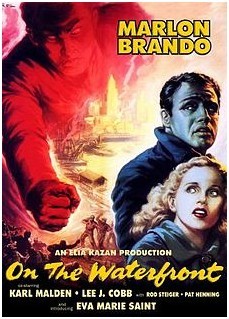

On the Waterfront is a 1954 American crime drama film about union violence and corruption among longshoremen. The film was directed by Elia Kazan and written by Budd Schulberg. It stars Marlon Brando, Karl Malden, Lee J. Cobb, Rod Steiger, and, in her film debut, Eva Marie Saint. The soundtrack score was composed by Leonard Bernstein. It is based on "Crime on the Waterfront", a series of articles in the New York Sun by Malcolm Johnson. The series won the 1949 Pulitzer Prize for Local Reporting. The stories detailed widespread corruption, extortion and racketeering on the waterfronts of Manhattan and Brooklyn.
On the Waterfront received 12 Academy Award nominations, winning eight, including Best Picture, Best Actor for Brando, Best Supporting Actress for Saint, and Best Director for Kazan. It is Leonard Bernstein's only original film score not adapted from a stage production with songs.
Plot
Mob-connected union boss Johnny Friendly (Lee J. Cobb) gloats about his iron-fisted control of the waterfront. The police and the Waterfront Crime Commission know that Friendly is behind a number of murders, but witnesses play "D and D" ("deaf and dumb"), accepting their subservient position rather than risk the danger and shame of informing.
Terry Malloy (Marlon Brando) is a dockworker whose brother Charley "The Gent" (Rod Steiger) is Friendly's right hand man. Some years earlier, Terry had been a promising boxer until Friendly had Charley instruct him to deliberately lose a fight that he could have won, so that Friendly could win money betting against him.
Terry is used to coax a popular dockworker, Joey Doyle (Ben Wagner), out to an ambush, preventing him from testifying against Friendly before the Crime Commission. Terry assumed that Friendly's enforcers were only going to "lean" on Joey in an effort to pressure him to avoid talking, and is surprised that Joey is killed. Though Terry resents being used as a tool in Joey's death, he is nevertheless willing to remain "D and D". Terry meets and is smitten by the murdered Joey Doyle's sister, Edie (Eva Marie Saint), who has shamed "waterfront priest" Father Barry (Karl Malden) into fomenting action against the mob-controlled union.
Soon both Edie and Father Barry are urging Terry to testify. Another dockworker, Timothy J. "Kayo" Dugan (Pat Henning), who agrees to testify after Father Barry's promise of unwavering support, ends up dead after Friendly arranges for him to be crushed by a load of whiskey in a staged accident.
As Terry, tormented by his awakening conscience, increasingly leans toward testifying, Friendly decides that Terry must be killed unless Charley can coerce him into keeping quiet. Charley tries bribing Terry with a good job, and finally threatens him by holding a gun up against him but recognizes that he has failed to sway Terry, who places the blame for his own downward spiral on his well-off brother. In what has become an iconic film scene, Terry reminds Charley that had it not been for the fixed fight, Terry's career would have bloomed. "I coulda' been a contender", laments Terry to his brother, "Instead of a bum, which is what I am - let's face it, Charley." Charley gives Terry a gun and advises him to run. Friendly, having had Charley watched, has Charley murdered, his body hanged in an alley as bait to get at Terry. Terry sets out to shoot Friendly, but Father Barry obstructs that course of action and finally convinces Terry to fight Friendly by testifying.
After the testimony, Friendly announces that Terry will not find employment anywhere on the waterfront. Edie tries persuading him to leave the waterfront with her, but he nonetheless shows up during recruitment at the docks. When he is the only man not hired, Terry openly confronts Friendly, calling him out, and proclaiming that he is proud of what he did.
Finally, the confrontation develops into a vicious brawl, with Terry getting the upper hand until Friendly's thugs gang up on Terry and beat him nearly to death. The dockworkers, who witnessed the confrontation, declare their support for Terry and refuse to work unless Terry is working too. Finally, the badly wounded Terry forces himself to his feet and enters the dock, followed by the other longshoremen despite Friendly's threats.
Reception
Upon its release, the film received rave reviews from critics and was a commercial success, earning an estimated $4.2 million in rentals at the North American box office in 1954. In his July 29, 1954, review, The New York Times critic A. H. Weiler hailed the film as a masterpiece, calling it "an uncommonly powerful, exciting, and imaginative use of the screen by gifted professionals."
In 1989, this film was deemed "culturally, historically or aesthetically significant" by the Library of Congress and selected for preservation in the United States National Film Registry. Film critic Roger Ebert lauded the film, stating that Brando and Kazan changed acting in American movies forever and then added it to his "Great Movies" list.
It is also on the Vatican's list of 45 greatest films of all time, compiled in 1995.
On the critics' website Rotten Tomatoes, the film holds a 100% "Certified Fresh" rating, based on 50 reviews.



















